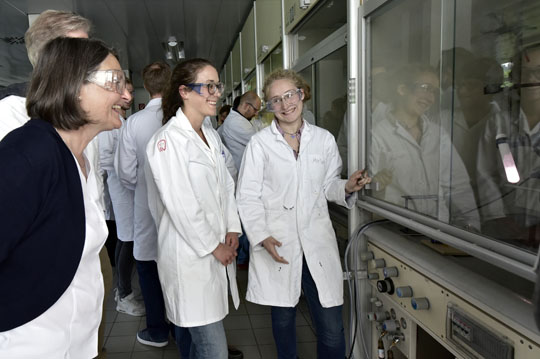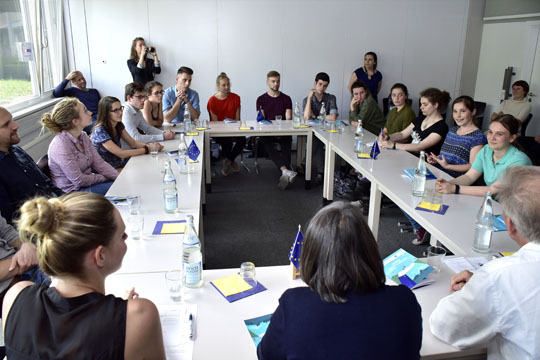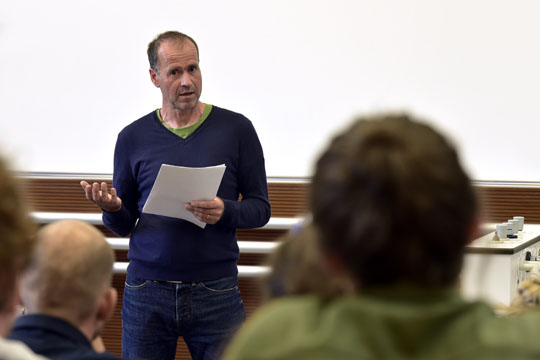Molecules and mutual understanding
Freiburg, Jun 08, 2017
Freiburg's District President Bärbel Schäfer visits exemplary European projects for her campaign "Europe makes it possible" ("Europa macht's möglich"). The Franco-German degree program "Regio Chimica" that the University of Freiburg and Université de Haute-Alsace collectively offer is one of them.
6140ea20deb768ef6c6475d64ac05bf8
For District President Bärbel Schäfer the degree program „Regio Chimica" is an example of what Europe makes possible. (only in German)
A group of German and French students are standing in a lab and are demonstrating how a gummy bear turns to a bright glimmering flame when placed in melted potassium chlorate. In truth all Freiburg chemistry students use the rooms in the chemistry skyscraper for their experiments. But the students in the bachelor's degree program "Regio Chimica" fiddle about in other labs as well: they spend half of their studies at the University of Freiburg and the other half at the Université de Haute-Alsace in Mulhouse.
"Of course it is an additional expense to study in two different languages and two different countries – but you get more out of it," says one student. "Companies are often looking for graduates with international experience and who are multilingual," confirms Mikel Mangold. After completing his bachelor's degree, he is now working on his master's degree in chemistry. It is not just about hard skills in the field, but about soft skills too.
Students, alumnae and alumni show Bärbel Schäfer practical chemistry experiments in the lab – such as sugar's reaction to heated potassium chlorate. "We want to demonstrate what Europe makes possible and which benefits we have here using concrete examples," says Schäfer. A part of it is gaining qualifications across borders and learning from one another. "I am also interested in building the sense of community in our common economic area," emphasizes Schäfer. Binational degree and training programs are an important part of that effort.
 A gummy bear up in flames: District President Bärbel Schäfer (left) observes how sugar reacts with heated potassium chlorate. Photo: Thomas Kunz
A gummy bear up in flames: District President Bärbel Schäfer (left) observes how sugar reacts with heated potassium chlorate. Photo: Thomas Kunz
Specialized, not single-minded
Most of the students are not just interested in a binational education for their improved chances in the job market. "We want to be highly specialized in our field, but we don't want to be single-minded. We want to see the Big Picture too," says Franziska Elterlein. After completing the Regio Chimica program, she went on to obtain a master's and is now working on her doctorate in chemistry.
The degree program does just that: along with chemistry, students attend lectures on topics such as intercultural and regional studies. They learn about the educational and political systems of the their partner country, for instance.
 Current and former students discuss their experiences during the degree program "Regio Chimica". Photo: Thomas Kunz
Current and former students discuss their experiences during the degree program "Regio Chimica". Photo: Thomas Kunz
"We are so pleased that our binational degree program has been so successful –after getting over the initial hurdles regarding the different management styles in Germany and France," explains Prof. Dr. Harald Hillebrecht, head of the "Regio Chimica" degree program in Freiburg.
 Harald Hillebrecht is the head of the degree program "Regio Chimica" in Freiburg. Photo: Thomas Kunz
Harald Hillebrecht is the head of the degree program "Regio Chimica" in Freiburg. Photo: Thomas Kunz
André Fuchs is a graduate of the program and now works in France at a company headquartered in Switzerland. He speaks from experience: "The molecules pretty much have the same names – but our mutual understanding is what matters. For that, you need to find the right language."
Nathalie Schnabel
Regio Chimica
The dual bachelor's degree program "Regio Chimica" began in 2010. The program is complete after six semesters with a certificate in Germany and France. The students spend their time both at the University of Freiburg as well as at the Université de Haute-Alsace in Mulhouse. In 2014 the degree program was awarded the Prix Bartholdi, which is meant to strengthen the Upper Rhine's three-country cooperation.
Regio Chimica
Eucor – The European Campus

